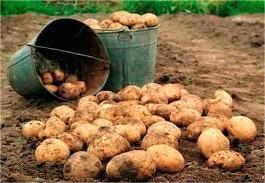
Irish potato farming has steadily grown into a key economic activity in Tindiret Sub-County, Nandi County helped by fertile highland soils and cool climate provide a favourable environment for the crop to thrive.
Once overshadowed by maize and tea, potatoes are now gaining recognition as a reliable source of income and food security for smallholder farmers, many of whom are diversifying to tap into the growing market demand both locally and beyond.
Walking through the rolling hills of Tindiret, neat rows of potato crop stand out against the landscape, signalling a quiet agricultural revolution taking shape in the sub county. Farmers here say potatoes are no longer just a subsistence crop but a commercial lifeline.
For instance, 38-year-old Josephine Chebet who lives Kapchorua village recalls how she shifted from maize to potatoes five years ago after struggling with fluctuating maize prices.
“With potatoes, I can harvest after three months and get quick money,” she says, noting that her half-acre plot now brings in an average of Ksh40,000 per season.
The crop’s popularity is also driven by its resilience. Farmers like Samuel Kiprotich in Chebarus village praise potatoes for performing well even with erratic rainfall.
“I used to rely on tea alone but now I combine it with potatoes. This helps me when tea prices drop,” Kiprotich explains.
Middlemen, however, remain a major challenge with many farmers lamenting that they sell their produce at throw-away prices during peak harvest and they sometimes earn as low as Ksh1,200 per a 90-kilogramme sack, despite the same bag fetching nearly double in Eldoret town markets.
To counter this, farmer groups are emerging like the Tindiret Potato Farmers’ Cooperative, formed last year, which is helping members pool their harvests and negotiate better prices.
According to the cooperative’s chairperson Mary Jepkemboi, collective marketing has improved incomes by up to 30 percent. Access to certified seeds is another hurdle as any farmers recycle tubers, leading to lower yields and vulnerability to diseases.
“We need more seed distribution centres close to us,” Peter Kogo, who has been growing potatoes for over a decade, says.
County officials acknowledge the gap and have promised interventions and in a recent agricultural field day, Nandi County’s agriculture officer David Sang said plans were underway to introduce high-yielding potato varieties and train farmers on best practices.
Despite the challenges, the potential remains vast as the cool climate of Tindiret, particularly in villages such as Kapsengere and Kapkures, offers conditions similar to those in traditional potato-growing zones like Nyandarua, giving farmers the confidence that the crop could transform livelihoods.
Women and youth are also finding opportunities. In Kaplamai area for instance, Janet Kitur, a 25-year-old agripreneur, has started supplying hotels in Nandi Hills with fresh potatoes directly from her farm.
“Hotels want clean, graded potatoes and I make more when I sort and package them well,” she explains.
Experts say that, with better infrastructure, storage facilities and access to credit, Tindiret could soon emerge as a potato hub in the Rift Valley.
For now, farmers continue to nurture their fields, hopeful that their humble potatoes would open new doors of prosperity.
- Tell Media / KNA report / By Sammy Mwibanda







